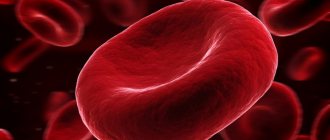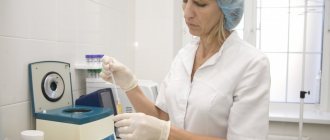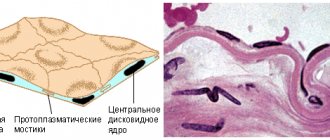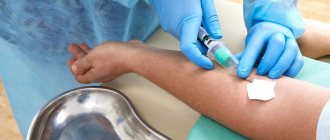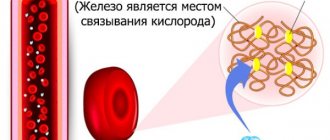Pregnant woman at a doctor's appointment: UGC Carrying out regular tests helps monitor the condition of the body during pregnancy. Mandatory regular tests during this period include urine analysis. Protein in the urine during pregnancy can be a sign of various pathologies and complications. Find out what protein in the urine of a pregnant woman means in this article.
Protein in urine during pregnancy: what does the test result mean?
Proteins are important participants in metabolic processes: they bring nutrients to cells, without them the production of hormones and tissue regeneration are impossible. If there are no “breakdowns” in the body, protein compounds, due to their large size, cannot pass through the renal filtration barrier. Therefore, when they do appear in the urine, this is a rather alarming symptom.
However, if a pregnant woman detects a small amount of protein in the test results, there is no need to be alarmed. The volume of blood in your body increases, which puts additional stress on your kidneys. The norm changes from trimester to trimester.
Indicator table
| 1-13 weeks | 14-26 weeks | 27-42 weeks | |
| Permissible norm, g/l | up to 0.033 | up to 0.04 | up to 0.05 |
High protein is divided into several levels.
Protein increase levels
| Level | Amount of protein, g/l |
| Microalbuminuria | up to 0.3 |
| Lightweight | up to 1 |
| Moderate | until 3 |
| Heavy | over 3 |
At high levels, additional diagnosis and treatment of the pathology due to which protein appeared in the tests is necessary.
Causes of increased protein in urine
Mild proteinuria can occur for a completely harmless reason. You are too tired after prolonged physical activity, have experienced stress, or have overeaten foods rich in protein compounds. Even simple hypothermia can increase protein in the urine.
Physiologically, albumin can occur when the kidneys change their position due to changes in the spine or pressure from the uterus. Another negative factor is dehydration, which develops as a result of insufficient water intake or excessive sweating. Usually, when retesting, traces of protein are not detected in this case.
Protein content above 3 g/l is due to the following reasons:
- Pyelonephritis in pregnant women.
This is inflammation in the kidneys. It occurs when the movement of urine through the urinary tract is disrupted, and microbes begin to multiply in them.
- Glomerulonephritis.
Infectious lesion of the glomerular apparatus of the kidneys. The main pathogens are streptococcus and staphylococcus.
- Renal cyst.
A formation on the surface of the kidney filled with fluid. It develops during pregnancy if a woman drinks alcohol, smokes, is constantly in contact with harmful chemicals, or has been exposed to x-rays.
- Stones in the kidneys or bladder.
They are formed when water-salt metabolism is disrupted, as a result of stress and due to unfavorable heredity.
- Preeclampsia.
Severe syndrome of the 3rd trimester of pregnancy, when a woman’s body ceases to cope with the tasks of providing the fetus with the necessary nutrition and oxygen.
The fetoplacental system is like a new endocrine gland
After implantation of the zygote in the uterine cavity, a new endocrine gland begins to form in the woman’s body - the placenta (baby place).
The placenta has two parts: fetal and maternal, the blood circulation of which never mixes. These parts of the placenta are as close as possible, which allows for the exchange of substances between the body of the mother and the fetus, i.e., in essence, allows the child to “eat, write and breathe,” and, therefore, grow and develop.
Metabolism between the mother and fetus is the main factor for its development. The exchange is carried out due to the permeability of the placenta, which is disrupted in most acute and chronic complications during pregnancy. Violation of the integrity of parts of the placenta and deterioration of its permeability leads to fetal death and termination of pregnancy.
The death of the fetus and termination of pregnancy is also possible for another reason, when the mother’s body suddenly decides that the fetus is a foreign protein for it. But this is actually true. However, nature has provided a protective mechanism that does not allow the mother's immune system to recognize antigens of paternal origin embedded in the child.
This protective mechanism consists of certain factors that block the mother’s immune system and provide local immunological comfort. With spontaneous abortions, blocking factors in the mother's blood are reduced or absent.
The placenta produces a wide range of hormones and specific proteins that enter the mother's blood and amniotic fluid. They regulate the normal course of pregnancy and fetal development by changing the function of other endocrine glands and life support organs in general.
By the level of hormones and specific proteins of the placenta, determined in the mother’s blood, in the fetal blood or in the amniotic fluid, the condition of the fetus and the function of the placenta can be assessed, which is what obstetric endocrinology deals with. Thus, studying the endocrine function of the fetoplacental complex can significantly improve the diagnosis of the fetal condition at different stages of pregnancy.
The appearance of a new endocrine gland leads to other changes in the female body.
The appearance of a woman changes. Appears:
- pigmentation of the skin (forehead, cheeks, chin, upper lip, white line of the abdomen, nipples and parapapillary zones), which is associated with significant stimulation of pigment formation by skin cells. The formation of pigment depends on the melanoform hormone of the adrenal gland, increased production of which occurs during pregnancy;
- low-grade body temperature is noted , which can last up to 16-20 weeks of pregnancy and is associated with hormonal fluctuations.
From the moment the placenta begins to produce progesterone, the temperature decreases and returns to normal.
- There is engorgement and soreness of the mammary gland due to an increase in its volume as a result of the proliferation of glandular tissue, enlargement of the nipples and protrusion of the areolar glands. In the second half of pregnancy, colostrum may be released;
- violation of facial proportions (enlargement of the nose, lips, chin, thyroid gland, especially in the second half of pregnancy), some enlargement of the limbs;
- stretching of the tissues of the anterior abdominal wall , mammary gland, thighs and the appearance of striae (“pregnant stripes”) in these areas (stria gravidarum). Their occurrence is associated with excessive stretching of the abdominal wall; this is more often observed in persons with a large abdominal volume (large fetus, polyhydramnios, multiple pregnancy) or with some lack of elastic fibers in the skin;
- varicose veins worsen or appear for the first time , especially in the lower extremities;
- The “proud posture and gait” of a pregnant woman is caused by a shift in the center of gravity of the body , increased mobility of the pelvic joints and limited mobility of the hip joints.
- Progressive increase in body weight , which is caused both by the growth of the fetus and uterus, and by the characteristics of metabolic processes and fluid retention in tissues. The average weight gain during pregnancy is 10-12 kg, of which 5-6 kg is due to the fertilized egg (fetus, placenta, amniotic fluid), 1.5-2 kg for enlarged uterus and mammary glands, 3-3.5 kg - to directly increase a woman’s body weight.
Before childbirth (3-4 days), a pregnant woman’s body weight drops by 1.0-1.5 kg, due to the peculiarities of metabolic processes.
Protein in urine during pregnancy: are there any symptoms?
If there is protein in the urine, the general condition of the patient depends on the provoking factors. So, if there is excess pressure on the kidneys from the uterus or spine, the pregnant woman complains of back pain and fever. Severe pain in the abdomen and bloody discharge from the urinary tract are a possible sign of stones passing through the urinary tract.
During gestosis during pregnancy, in addition to protein in the urine, severe swelling, signs of toxicosis, pain in the back and head, and increased blood pressure occur.
Other unpleasant symptoms accompanying the appearance of albumin in the urine:
- drowsiness and increased fatigue;
- nausea and vomiting;
- blood in urine;
- chills, fever;
- loss of appetite.
It also happens that with an increased level of protein, a pregnant woman feels well, no other signs indicate pathology. This is possible if the test was performed incorrectly and vaginal discharge containing free proteins entered the urine, or changes occurred due to physiological reasons.
Another option is the early, still asymptomatic course of the disease, when additional diagnostics are required. After all, the presence of protein in the urine can lead to serious consequences for the health of the expectant mother and child.
Dear men, loving husbands!
Remember that your pregnant wife is an “unusual” person the entire time she is carrying your child. That is why a loving husband should not allow his wife to overwork herself with housework. A pregnant woman needs to create favorable conditions so that she can safely bear and give birth to a child, i.e. so that her body can qualitatively adapt to changing conditions as the pregnancy progresses (the baby grows, develops, eats, “breathes,” etc. - conditions are constantly changing).
If a pregnant woman’s body cannot adapt normally, then she will experience various unfavorable conditions, primarily for the child. For a woman, these are also unfavorable conditions. In especially severe cases, pregnancy is sacrificed to save the woman, because... terminating a pregnancy in this condition immediately leads to recovery (conditionally to recovery), but your child will no longer be born.
Always take care of women! And especially during pregnancy!
Why is proteinuria dangerous?
Without timely treatment, the appearance of protein in the urine is accompanied by serious pregnancy complications:
- swelling of the limbs, face and internal organs;
- constant vomiting;
- arrhythmia and shortness of breath;
- high pressure inside blood vessels;
- renal failure;
- premature aging of the placenta and the threat of miscarriage;
- fetal hypoxia and related disorders.
The danger of gestosis and preeclampsia lies in the rapid increase in symptoms. Blood pressure rises, convulsions appear, the woman may lose consciousness and even fall into a coma. Hypertension increases the risk of hemorrhagic stroke.
Bacterial urinary tract infections cause blood poisoning. If bacteria enter the amniotic fluid, the baby will become infected before birth.
Therefore, any deviations in the results of urine tests during pregnancy require additional diagnostics, specialist consultation and treatment.
How to reduce high rates
Albumin within 0.14 g/l, not accompanied by other alarming symptoms, usually does not indicate the presence of any disorder, but requires special attention from the attending physician. Therefore, the first thing you will be asked to do if you have elevated protein in a urine test is to retake the test correctly.
We pass the analysis without errors
To ensure accurate results, prepare the test material according to the following rules:
- Use only a sterile medicine container.
- Before collection, toilet the external genitalia.
- During collection, it is better to cover the vagina with sterile cotton wool or a napkin.
- The entire portion of biological fluid is collected.
- The sample must be delivered to the laboratory no later than 2 hours after collection.
In some cases, if protein is detected in the urine, a specialist may prescribe a daily test to assess kidney function. To do this, all urine, with the exception of the first morning urine, should be collected in a large container. Then measure and record the resulting volume, mix and pour 50 ml into a sterile container.
Adjusting your diet
Protein in the urine may be due to dietary disorders. Therefore, before taking a re-test, 4-5 days beforehand, avoid excessive consumption of protein foods - meat, dairy and legumes. Completely exclude smoked, pickled, fried, salted foods. In case of severe toxicosis, warm food is recommended rather than hot.
Fish and dietary meat, such as turkey, are allowed. Vegetables, fruits and berries, grains rich in fiber are the basis of a healthy diet during pregnancy. Maintain a drinking regime: even with gestosis, insufficient fluid intake not only does not help reduce swelling, but also increases its severity.
Eat small meals 5-6 times a day. Moderation and a healthy diet eliminate excess elements and additional stress on the kidneys.
Don't forget about physical activity
Select loads according to the stage of pregnancy. Regular walks, swimming, special exercises, Pilates and yoga improve blood flow, including in the kidneys, due to which the amount of protein in the urine can decrease even without additional drug therapy.
Let's look at other indicators
The specialist does not “treat” tests. For an accurate diagnosis, the gynecologist takes into account the general condition of the patient, complaints of pain, swelling, and data from other studies. Thus, if kidney or urinary system disease is suspected, an ultrasound scan is required. In addition to protein, pyelonephritis will also be indicated by an increased level of leukocytes and red blood cells in a urine test. Treatment of inflammation and infections of the genitourinary system during pregnancy includes taking antibacterial drugs.
Protein in the urine in later stages is usually associated with gestosis in pregnancy. To confirm the diagnosis, the woman’s blood pressure and the degree of swelling of the limbs and face are assessed. An ultrasound examination of the uterus and fetus is performed. Therapy takes place exclusively in a hospital setting.
How to properly submit urine for analysis
On the eve of the test, it is recommended to refrain from intense physical activity, not to eat a lot of meat products, salty, sour and spicy foods, as well as coloring foods (beets, carrots, etc.). This can lead to a distorted result - the appearance of protein and salts in the urine. For a general urine test, it is preferable to collect a morning urine sample.
First, thoroughly clean the external genitalia with warm water and soap. It is better to cover the vagina with a cotton swab to prevent secretions from getting into the urine sample. Urine is collected in a clean, dry container. For the analysis, an average portion of urine is used, that is, for the first few seconds you need to urinate into the toilet, then into a jar, and the rest back into the toilet.
It is necessary to deliver urine to the laboratory within two hours from the moment of collection, and it is advisable to try not to subject it to strong shaking during transportation. It is allowed to store urine in the refrigerator at a temperature of +2-+4 degrees, but not more than 1.5 hours. It is desirable that the amount of material collected for research be at least 70 ml.
Prevention of proteinuria
The best way to prevent any pregnancy complications is to plan and prepare the body for conception. Give up bad habits, undergo a medical examination and treatment for hidden infections.
To reduce the risks associated with high protein in your urine, do not skip routine visits to your doctor and get tested before each appointment. Monitor your weight gain and measure your blood pressure regularly. Eliminate “harmful” foods from the menu. If your health worsens, be sure to inform your doctor.
You can get a urine test for protein at an affordable price at the Women's Medical Center. Completion time: 1 day. You will receive a detailed result containing data on protein, leukocytes, red blood cells and other important indicators. You can decipher the analysis by scheduling a consultation with a Center specialist.
